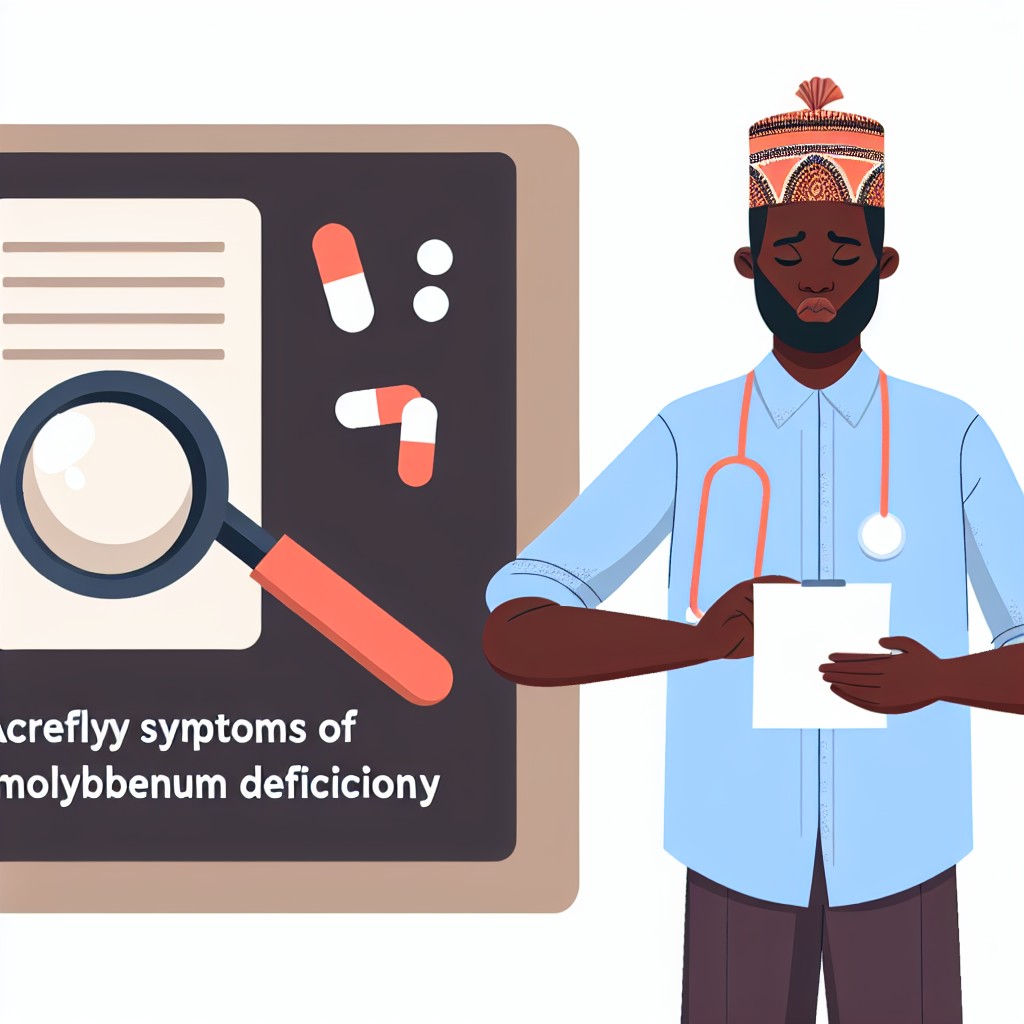Introduction
Molybdenum is an essential mineral.
It plays a vital role in various enzymatic functions within the body.
This mineral is crucial for overall health and well-being.
Molybdenum supports metabolism and helps break down certain amino acids and toxins.
Deficiency in molybdenum can lead to health problems because of its role in enzyme activity.
Common signs of deficiency include fatigue.
People may also experience rapid heart rate and neurological issues.
It is important to address molybdenum deficiency promptly.
This helps prevent further health complications.
Proper treatment supports optimal functioning of the body.
What is molybdenum deficiency?
Molybdenum deficiency occurs when the body does not have enough of this essential mineral to function properly.
Explanation of molybdenum deficiency
Molybdenum is a trace mineral that plays a crucial role in various bodily functions.
These functions include metabolism and enzyme activity.
Causes of molybdenum deficiency
- Poor dietary intake: Not consuming enough molybdenum-rich foods can lead to deficiency.
- Gastrointestinal disorders: Conditions like Crohn’s disease can affect molybdenum absorption.
- Genetic factors: Some individuals may have genetic mutations that impact molybdenum utilization.
Common signs and symptoms of molybdenum deficiency
- Fatigue and weakness: Molybdenum deficiency can result in low energy levels and feelings of tiredness.
- Sensitivity to sulfites: People deficient in molybdenum may experience adverse reactions to sulfite-containing foods.
- Rapid heart rate: An inadequate supply of molybdenum can lead to heart palpitations and irregular heartbeat.
- Poor growth in children: Molybdenum is essential for proper growth and development in young individuals.
- Joint pain: Deficiency in molybdenum has been linked to joint issues and musculoskeletal problems.
It is important to address molybdenum deficiency promptly through dietary changes and supplementation.
This helps prevent long-term health complications.
Unlock the Power of Nigerian Food Minerals
Discover personalized Food Advisory tailored to boost your health or business using expert insights on Nigerian minerals.
Get StartedHealth problems associated with molybdenum deficiency:
- Impact on metabolism
- Connection to anemia
- Effect on brain function
- Relationship to hormonal balance
Impact on Metabolism
Molybdenum plays a crucial role in various metabolic processes within the body.
A deficiency in molybdenum can lead to disruptions in these metabolic pathways.
This can result in decreased energy production and inefficient utilization of nutrients.
Connection to Anemia
Molybdenum is essential for the proper function of enzymes involved in iron metabolism.
A deficiency in molybdenum can impair iron absorption and utilization in the body.
This can lead to the development of anemia, characterized by low red blood cell count.
Effect on Brain Function
Molybdenum is important for the synthesis of neurotransmitters in the brain.
A deficiency in molybdenum can affect the production of these essential brain chemicals.
This can lead to cognitive issues, memory problems, and mood disturbances.
Relationship to Hormonal Balance
Molybdenum plays a role in regulating the activity of certain hormones in the body.
A deficiency in molybdenum can disrupt the delicate balance of hormones.
This can lead to hormonal imbalances, affecting various bodily functions and processes.
Molybdenum deficiency can have significant impacts on overall health.
Captivate Your Audience with Exclusive Nigerian Food Content
Imagine your platform enriched with unique, mineral-rich Nigerian cuisine stories that no one else can offer. Let's create content that resonates deeply and sets you apart.
Get StartedIt is important to ensure adequate intake of molybdenum through diet or supplementation.
Consulting with a healthcare provider can help in correcting molybdenum deficiency and preventing associated health problems.
Delve into the Subject: Cobalt Deficiency: Symptoms and Dietary Sources
Diagnosing Molybdenum Deficiency
When it comes to diagnosing molybdenum deficiency, several important factors exist.
These factors range from diagnostic procedures to consulting a healthcare professional.
Let us explore the different aspects involved in diagnosing this deficiency.
Diagnostic Procedures for Molybdenum Deficiency
- One key diagnostic procedure is assessing the individual’s dietary intake of molybdenum.
- Healthcare professionals also consider the person’s medical history and symptoms when diagnosing.
- Physical examinations and tests help determine if someone suffers from this deficiency.
Importance of Consulting a Healthcare Professional
- It is crucial to consult a healthcare professional if you suspect molybdenum deficiency.
- Healthcare professionals have the expertise to properly diagnose and treat this deficiency.
- They can recommend appropriate tests and treatments based on your individual needs.
Methods for Determining Molybdenum Levels
- Blood tests commonly determine molybdenum levels in the body.
- Urine tests may also assess molybdenum levels and potential deficiency.
- Other methods, like hair analysis, provide additional insights into molybdenum status.
Diagnosing molybdenum deficiency requires a comprehensive approach with various tests.
You should seek medical advice promptly for proper diagnosis and treatment if you suspect deficiency.
See Related Content: From Deficiency to Health: Nigerian Foods That Fill Mineral Gaps
When it comes to correcting molybdenum deficiency, there are several strategies that can be implemented.
These strategies ensure proper intake of this essential mineral.
Dietary sources of molybdenum
One of the best ways to increase molybdenum levels in the body is through dietary sources.
Foods rich in molybdenum include legumes, nuts, seeds, whole grains, leafy green vegetables, and organ meats.
Incorporating these foods into your daily diet can help boost your molybdenum intake.
Molybdenum supplements
In cases where dietary sources are not sufficient, molybdenum supplements can be taken.
Supplements are available over-the-counter and should be taken as directed by a healthcare provider.
This helps avoid excessive intake and possible complications.
Potential interactions with other nutrients or medications
It is important to be mindful of potential interactions between molybdenum supplements and other nutrients or medications.
Consult with a healthcare provider or pharmacist to ensure there are no adverse interactions.
These interactions could affect your overall health.
Significance of maintaining a balanced diet for molybdenum intake
While supplements can assist in correcting molybdenum deficiency, a balanced diet remains crucial for overall health.
A diet rich in a variety of nutrients, including molybdenum, helps prevent deficiencies.
It also promotes optimal well-being and vitality.
By following these strategies, individuals can effectively correct molybdenum deficiency.
These approaches support overall health and well-being.
Find Out More: Addressing Phosphorus Deficiency: Foods and Remedies

Tips for preventing molybdenum deficiency:
- Importance of a varied and balanced diet.
- Incorporating molybdenum-rich foods into meals.
- Being mindful of cooking methods that may reduce molybdenum content in food.
Importance of a varied and balanced diet
In order to prevent molybdenum deficiency, it is crucial to maintain a diet that is diverse and nutritious.
By eating a variety of foods from different food groups, you can ensure getting sufficient molybdenum.
This approach also provides other essential nutrients needed for health.
Incorporating molybdenum-rich foods into meals
Some foods rich in molybdenum include legumes, grains, nuts, and leafy vegetables.
Including these foods daily can boost molybdenum intake and reduce deficiency risk.
Try adding lentils, beans, spinach, or quinoa to your salads, soups, or stir-fries for nutrition.
Being mindful of cooking methods that may reduce molybdenum content in food
Certain cooking methods can decrease molybdenum in foods.
For example, boiling vegetables may cause molybdenum to leach into cooking water.
To retain more molybdenum, consider steaming or stir-frying instead of boiling.
Using acidic ingredients like lemon juice or vinegar can help preserve molybdenum content.
Following these tips and adjusting diet and cooking habits helps prevent molybdenum deficiency.
Uncover the Details: Magnesium Deficiency Signs and Top Foods to Include
Health Effects and Management of Molybdenum Deficiency
Molybdenum deficiency can cause fatigue.
It may also result in joint pain.
Another symptom includes anemia.
Recognizing these signs early is important.
Addressing the deficiency promptly promotes optimal health.
If you suspect a molybdenum deficiency, seek medical advice.
A healthcare provider can perform tests to confirm the deficiency.
They can also recommend appropriate dietary changes or supplements.
Molybdenum is a trace mineral essential for enzyme activation.
It also supports nutrient absorption in the body.
By addressing deficiencies early, you improve overall well-being.
This proactive approach helps prevent future health complications.
Additional Resources
Frequency, pattern and predictors of cognitive impairments in …




